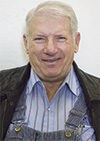Our conversation on the CB radio had been the usual bellyaching about the perennial headwind.
Traffic ahead of us seemed to have an obstruction, then someone on the CB radio said something about a hay truck on fire. We both checked our mirrors to confirm it wasn’t us.
Every hay hauler competes with every other hay hauler. Every hay hauler will also stop and help any other hay hauler. Leo and I stopped far enough from the now smoking load of hay to be sure our trucks didn’t join the “on fire” scene should the wind pick up.
The fire had started in the usual place, about halfway down the load level with the driver’s window. We arrived on foot, each carrying our hay chaps and hay hooks, knowing there was a good possibility that, to save the truck, the burning cargo would need to be thrown off.
The driver was ecstatic because a truck hauling liquid nitrogen had stopped and blasted the flaming area with an unloading hose. The driver claimed he was good to go and that the fire was out. The tanker truck rolled up his hose and left.
We asked the driver if he had ever hauled hay before. “No.” Had he ever been around a haystack or hay truck fire? “No.”
We explained to him that most likely the helpful tanker driver had only blasted some of the flame and burning hay into the center of his load, from the surface, and any second now he was about to see a lot of smoke. The driver was defiant that the fire was out, and he intended to drive on up the road.
Then a bystander yelled from the right side of the truck, “We got lots of smoke over here.”
We looked. We stopped arguing with the driver and told him he had to get the burning hay off his truck or it too would burn. Leo and I strapped on our hay chaps and started climbing to the top of the load. We told the driver to untie the load, then be ready to pull the truck forward so the burning hay we threw off wouldn’t catch the rest of the rig on fire.
It took us about 20 bales to get close to the fire, but we got to it before there were enough open flames to start the two fat boys on fire. I believe we had the driver pull up about three times before we had all the fire thrown off the truck. With the truck 30 feet ahead of the smoldering hay in the bar ditch, we advised the driver to watch the hay on his truck for a while to make sure we got it all. About that time, the fire trucks showed up. I remember telling them to stop wasting their water on the burning hay and pay attention to the dry grass beside it.
We told the driver to get rid of anything in the cab that might make it appear he had been smoking and had inadvertently set his own truck on fire. He was stuttering pretty bad and didn’t even thank us for saving his truck. We left as the fireman in charge came asking who was driving the truck.
Back at our rigs, we stowed hooks and chaps and then very carefully inspected our own loads for fire before driving west. About two-and-a-half hours later, as Leo and I were finishing supper at a truck stop, we observed a truck with a very disturbed half-load of hay pull into the parking lot. “Looks like we got it all,” mused Leo.
Another time, Kennon said one day he had a passenger with him as he left the Columbia Basin headed towards Seattle, Washington, with a load of hay. The cheapest diesel fuel was at Kittitas, and that’s where he intended to fill up. He missed it by about 7 miles.
As his truck rolled to an embarrassing stop, he grabbed the CB radio mic and called out, “Hey guys, I just ran out of fuel.” Somebody asked where he was and which direction he was going. In about a minute, he had a volunteer with a 5-gallon can and a hose who said he’d stop and get him going, and he did.
The passenger, a kid from out of the area who had never been around trucks or hay or cows, was amazed. He asked Kennon, “Did you know the guy who stopped?” “No.” “How much did he charge you for stopping and putting some diesel in your truck?” “He didn’t.” The kid was dumbstruck.
We may get into fistfights at haystacks or feed stores, and we are all competing with each other, but when any one of us is stopped beside the road with a problem, then we’re all family. ![]()









